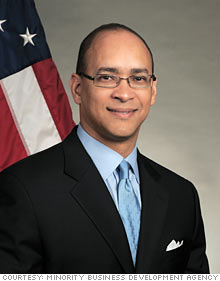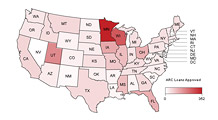Minority Business Development chief: Get big or get bought
The fastest way to improve the prospects of minority-owned businesses is to persuade more owners to get on the M&A bandwagon, the head of the government's development efforts says.
 |
| David Hinson |
(CNNMoney.com) -- David Hinson is the new administrator of the Minority Business Development Agency, a branch of the U.S. Department of Commerce that helps minority entrepreneurs start and grow their companies. Hinson, who started in July, was previously president and CEO of Wealth Management Network, an investment advisory firm in New York City.
The agency's top goal is to achieve entrepreneurial "economic parity," matching the percentage of businesses owned by minorities with their representation in the U.S. population. If that target is reached, MBDA believes minority companies would generate $2.5 trillion in annual revenues, create 16 million jobs and contribute $100 billion in annual taxes. Today, the nation's 4 million minority-owned firms have revenue of around $660 billion and employ 4.7 million workers.
MBDA plants to assist minority businesses by helping them focus on growth through mergers and acquisitions. Hinson believes this initiative could go a long way in revitalizing the economy, since he says minority firms tend to hire equal numbers of minority and non-minority employees: "The case for minority business is not a minority case -- it's an American case." CNNMoney.com spoke with him to learn more about his plans.
What are your top priorities for the MBDA right now?
My top priority is to create a new generation of diverse businesses with $100 million in annual revenue. MBDA will create a foundation that closes the gap in annual revenue between minority-owned firms and the non-minority-owned firms. For example, minority businesses on average generate less than $200,000 in annual revenue, yet non-minority-owned businesses average more than $400,000.
There's a ton of reasons there are differences. The most glaring are access to capital, access to contract opportunities, and access to, oftentimes, a cost structure that's higher. On average, minority firms pay more for their loans at the same credit risk as majority firms.
We're also working on relationship access. Many of the business opportunities that are realized are through relationships, and minority businesses have a more difficult process they have to go through to create those relationships.
Minority firms represent approximately one-third of the U.S. population, and by 2050, the U.S. Census Bureau predicts minorities will make up more than half the U.S. population. The future of our economy depends on the success of minority-owned firms.
How is the MBDA working towards economic parity for minority businesses?
We have to change how companies currently view growth. We will focus less on organic growth at the start-up level and more on companies that want to grow through mergers and acquisitions, resulting in significant revenue growth and job creation.
The primary capital for organic growth is loans, and that market has essentially been frozen. On the other hand, there is more money for buying cash flows, because the risk is perceived as being less. So there's actually more money for strategic partnerships, mergers and acquisitions.
How is the current recession affecting minority-owned businesses? Is there a difference in how they're affected versus small businesses as an overall group?
The economic downturn has affected all businesses' ability to access capital. Lack of access to capital stunts business growth, and minority-owned businesses have been especially hard hit.
In 2008, MBDA generated more than $2 billion in contracts and financing for the minority business community. This means for every taxpayer dollar spent, MBDA generated a return on investment of $74. And this year, during the worst economic downturn in history, we've already generated $1.77 billion in contracts and financing.
So while access to capital continues to be a challenge, our minority business centers throughout the country continue to build relationships and create opportunities for minority firms to access necessary capital for growth.
How does your entrepreneurial experience as the founder of Wealth Management Network influence your current goals for the MBDA?
I am intimately aware of the opportunities and challenges diverse-owned firms face in the current economic environment. This experience has allowed me to focus MBDA resources on what is necessary for diverse entrepreneurs to achieve success.
We need to educate diverse entrepreneurs and change the vocabulary of diverse business growth -- moving from being start-ups to being acquisition-ready. Diverse firms need to consider strategic alliances, joint ventures and mergers and acquisitions as part of their overall growth strategy.
How does President Obama view the agency's role in aiding economic development?
The President has tasked Secretary of Commerce Gary Locke and the Small Business Administration to make sure minority-owned businesses are included in the American Recovery and Reinvestment Act opportunities.
Most of the economic stimulus money is flowing through the states. We've asked our 48 business centers to work with the companies on the state level to assist them with meeting the necessary state-level procurement people so they have a better chance to compete for these contracts.
It's about having the chance to have your business considered fairly and equitably. ![]()
-
The Cheesecake Factory created smaller portions to survive the downturn. Play
-
A breeder of award-winning marijuana seeds is following the money and heading to the U.S. More
-
Most small businesses die within five years, but Amish businesses have a survival rate north of 90%. More
-
The 10 most popular franchise brands over the past decade -- and their failure rates. More
-
These firms are the last left in America making iconic products now in their twilight. More










